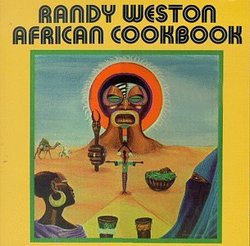| All Artists: Randy Weston Title: African Cookbook Members Wishing: 2 Total Copies: 0 Label: Koch Records Release Date: 3/23/1999 Genres: Jazz, Pop Styles: Modern Postbebop, Bebop Number of Discs: 1 SwapaCD Credits: 1 UPCs: 090431675922, 099923851721, 0090431675922, 603497052660, 009043167592 |
Search - Randy Weston :: African Cookbook
 | Randy Weston African Cookbook Genres: Jazz, Pop
Featuring the band and material that played the group's send-off at the Monterey Jazz Festival in 1966 (resulting in the long-overdue issue of the Monterey '66 CD in 1993), this Randy Weston band held solid ground in the s... more » |
Larger Image |

 Track Listings (7) - Disc #1
Track Listings (7) - Disc #1